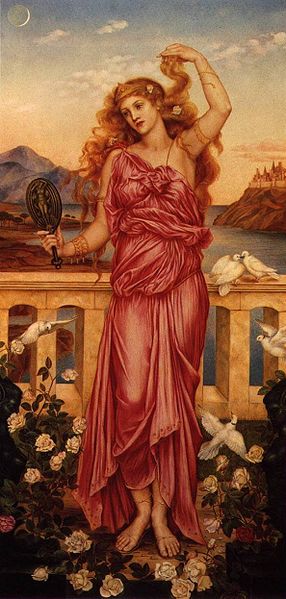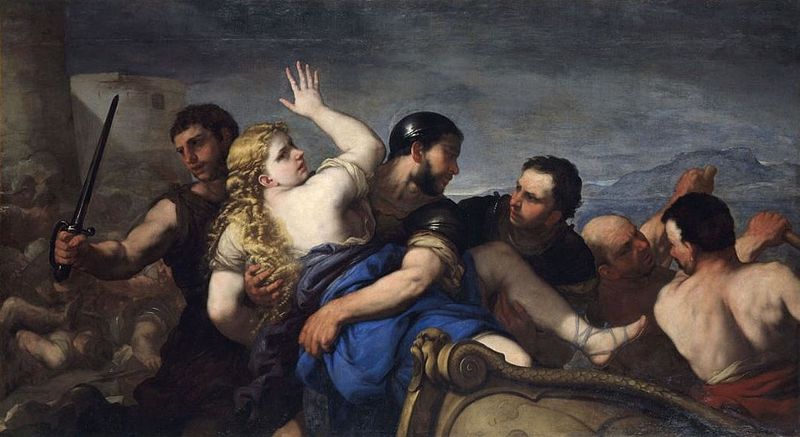THE OATH OF TYNDAREUS IN GREEK MYTHOLOGY
The name of the mythological Spartan King Tyndareus is today most famous from the sacred oath that bares his name; for the Oath of Tyndareus was the promise that ultimately brought together the Achaean forces to the gates of Troy.
King Tyndareus
Tyndareus was the wife of Leda, father of Castor and Clytemnestra, and step-father of Pollox and Helen. Tyndareus was one of the most powerful kings of his day, and managed to unseat Thyestes from the throne of Mycenae went he sent his Spartan army there. Thus, Tyndareus was the man who put Agamemnon on the throne of Mycenae, and made him his son-in-law, for Agamemnon married Clytemnestra.
Helen Daughter of Tyndareus
|
Tyndareus though had far greater problems when it came to marrying off his other daughter Helen.
The King of Sparta sent out heralds announcing that eligible suitors could now present themselves, for Helen of Sparta was now of age. In hindsight, this might not have been the cleverest announcement to make, for Helen was recognised across the ancient world as the most beautiful woman of the mortal plain. As a result, heroes, kings and princes travelled in their droves to Sparta. |
|
The Suitors of Helen
|
Various ancient sources, including Catalogues of Women (Hesiod), Fabulae (Hyginus), and the Bibliotheca (Pseudo-Apollodorus), provide various different names.
Six names appear in all three sources; Ajax the Greater, son of Telamon, and already a great warrior; Elephenor, king of the Abantes, Menelaus, son of Atreus, exiled Mycenaean prince; Menestheus, King of Athens; Odysseus, son of Laertes, King of the Cephallenians;; and Protesilaus, son of Iphicles. Across the sources though many other notable names appeared as Suitors of Helen, including Ajax the Lesser, the son of Oileus and prince of Locris; Diomedes, the mighty warrior and King of Argos; Patroclus, son of Menoeitus, and friend of Achilles; Philoctetes, son of Poeas, Thessalonian prince and acclaimed archer; Idomeneus, a prince of Crete; and Teucer, son of Telamon and half-brother to Ajax the Great. |
Tyndareus' Dilema
The gathered Suitors of Helen represented all of the most powerful kingdoms of Ancient Greece and many were regarded as the best warriors of the day.
Each Suitor brought with them gifts, but Tyndareus quickly realised he was in an impossible position for choosing one suitor over the others would lead to bloodshed between them, and a great deal of animosity between the different Greek states.
Each Suitor brought with them gifts, but Tyndareus quickly realised he was in an impossible position for choosing one suitor over the others would lead to bloodshed between them, and a great deal of animosity between the different Greek states.
The Oath of Tyndareus
|
Tyndareus delayed making a decision and whilst the king waited, Odysseus came up with a solution to his dilemma.
Odysseus recognised that other Suitors of Helen were even more eligible than himself, so the son of Laertes had instead turned his attention to Penelope, the daughter of Icarius. Being the daughter of Icarius meant that Penelope was the niece of Tyndareus, and so upon the promise of assistance in gaining the hand of Penelope, Odysseus told Tyndareus of his idea. Odysseus told Tyndareus that the king should extract from each suitor an oath that they would protect and defend whichever Suitor of Helen was chosen. No hero of note would break such an oath, and even if someone did, then they would have to face the force of the other Suitors who were bound to protect Helen’s husband. Tyndareus put forth Odysseus’ plan, and each Suitor took the Oath of Tyndareus, with the sacred promise, and the oath was bound when Tyndareus sacrificed a horse. The Implications of The Oath oF TyndareisTyndareus gave Helen a free choice in terms of which suitor to choose, and Helen chose Menelaus to be her husband; and because of the Oath of Tyndareus all the other suitors left Sparta with their honour intact.
|
|
The Oath of Tyndareus would of course be invoked by Menelaus when Helen was alter abducted from Sparta by the Trojan prince Paris. All of the Suitors of Helen would eventually gather at Aulis, although some did need persuading, including Odysseus the inventor of the Oath. From Aulis a fleet of 1000 ships set sail for Troy to retrieve the wife of Menelaus.
|
|

